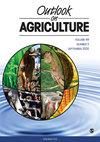性别角色的改变降低了玉米产量,但汇款抵消了这一影响:来自尼泊尔喜马拉雅山脉中部移民家庭的调查结果
IF 2.6
3区 经济学
Q1 AGRICULTURE, MULTIDISCIPLINARY
引用次数: 1
摘要
在本文中,我们研究了劳动力外流、性别角色变化及其对玉米种植系统的影响之间的相互作用。该论文利用从尼泊尔山区1053个移民家庭收集的数据,揭示了这些相互作用。结果表明,家庭规模和17-60岁家庭成员数量对玉米产量有正向影响。汇款收入和饲养家畜提高了玉米产量。地理位置,尤其是山区的玉米种植,显示产量下降(25.6%)。移民的妻子表示,与其他家庭成员相比,玉米产量较低(5%)。除了这些背景因素外,妇女更多地参与家务劳动、饲养和照顾农场动物以及社区活动,严重影响了玉米产量。但是,汇款收入抵消了损失。由于妇女在农业中的作用至关重要,特别是在男性劳动力外流的背景下,研究和开发实践的性别变革方法将确保社会正义和公平的利益分享。因此,考虑到他们在制定和设计农业干预措施时的选择和偏好,对于山区农业系统的长期可持续性至关重要。本文章由计算机程序翻译,如有差异,请以英文原文为准。
Changing gender role declines maize yield, but remittances offset: Findings from migrant households in the central Himalayas, Nepal
In this paper, we investigate the interplay between labor out-migration, changes in gender roles, and their effects on the maize farming system. The paper unravels these interactions using the data collected from 1053 migrant households in the mountains of Nepal. The result shows that household size positively and the number of 17–60-year-old household members negatively influence maize yield. Remittance income and raising farm animals enhanced maize yield. Geography, especially maize farming in the mountains, showed a reduction (25.6%) in yield. The migrants’ wives stated less maize yield (5%) compared to the other household members. In addition to these contextual factors, women's increased participation in the household chores, rearing and caring of farm animals, and community activities significantly compromised maize yield. However, the remittance income offsets the loss. As women's role in agriculture is central, especially in the context of male labor out-migration, gender-transformative approaches to research and development practices would ensure social justice and equitable benefit sharing. Accounting for their choices and preferences in developing and designing agricultural interventions is thus vital for the long-term sustainability of the mountain farming systems.
求助全文
通过发布文献求助,成功后即可免费获取论文全文。
去求助
来源期刊

Outlook on Agriculture
农林科学-农业综合
CiteScore
5.60
自引率
13.30%
发文量
38
审稿时长
>36 weeks
期刊介绍:
Outlook on Agriculture is a peer reviewed journal, published quarterly, which welcomes original research papers, research notes, invited reviews and commentary for an international and interdisciplinary readership. Special attention is paid to agricultural policy, international trade in the agricultural sector, strategic developments in food production, the links between agricultural systems and food security, the role of agriculture in social and economic development, agriculture in developing countries and environmental issues, including natural resources for agriculture and climate impacts.
 求助内容:
求助内容: 应助结果提醒方式:
应助结果提醒方式:


